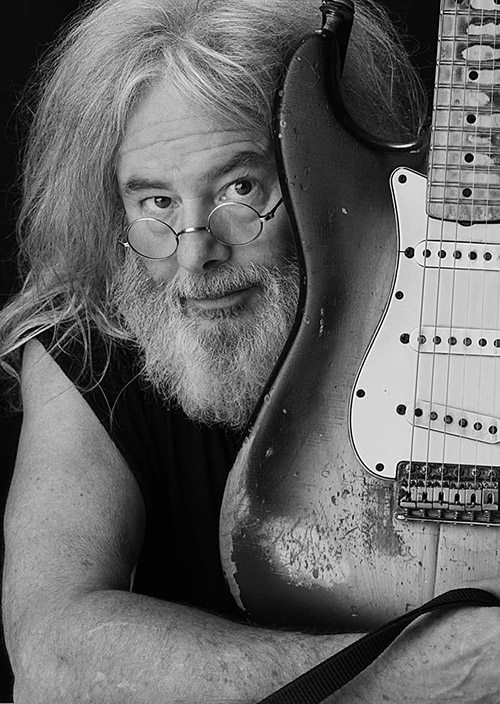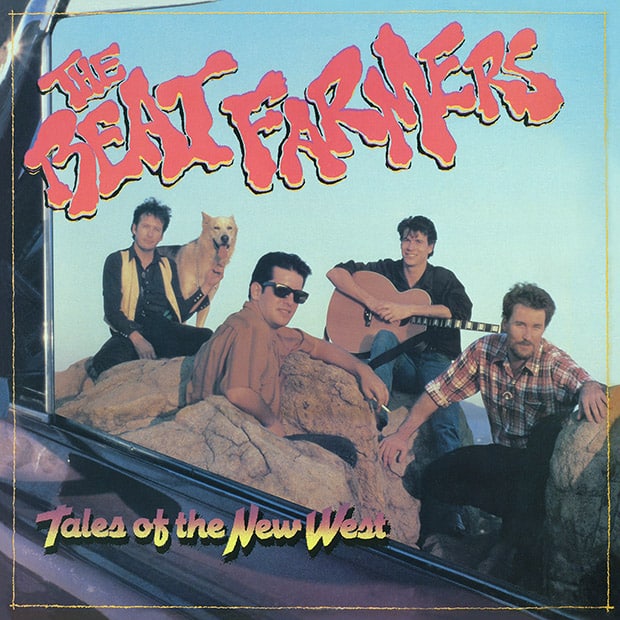
Photo by Rosie Fitts. Hand lettering by Country Dick Montana
One of the many great things about taking a stroll down the Beat Farmers’ Memory Lane is there is no need for a designated driver.
A one-of-a-kind four piece made the scene in the early 1980s, creating a still-resonating sonic explosion that left a psychedelic mushroom cloud over a tiny San Diego dive bar. The Beat Farmers debut album, “Tales of the New West,” is being re-issued together with a demo it made seeking its first record deal, the 21-song “Live at The Spring Valley Inn, 1983.”
Musicians lament signing away their publishing rights forever to record companies. However, when completing the Copyright Reversion Act paperwork, the time period now is 35 years after the publication. The record rep who discovered the Beat Farmers, Dan Perloff, ran point on getting the albums reissued on CD and vinyl on the label Blixa Sounds. He intends to do the same with the band’s entire collection. There were seven studio and three live albums.
The “Tales of the New West” reissue includes a 24-page booklet with extensive liner notes, photos and recollections from various artists who were around the band during its early days.
“As things move along, the members of the band will own their U.S. copyrights to their master tapes,” said Perloff, who was a San Diego State student and area representative for Rhino Records when he learned about the Beat Farmers. Like everyone who ever witnessed one of the band’s singular shows, he was blown away.
The original Beat Farmers had dual lead guitarists, Jerry Raney on a Les Paul Junior and Buddy Blue on a hollow body six string.
“Kind of the way the Beat Farmers came together and created that sound was Buddy Blue had the rockabilly blues style,” Raney said. “He had a band called the Rockin’ Roulettes. I had the rock ‘n’ roll style. The two guitars played together nicely to make it into something else.”
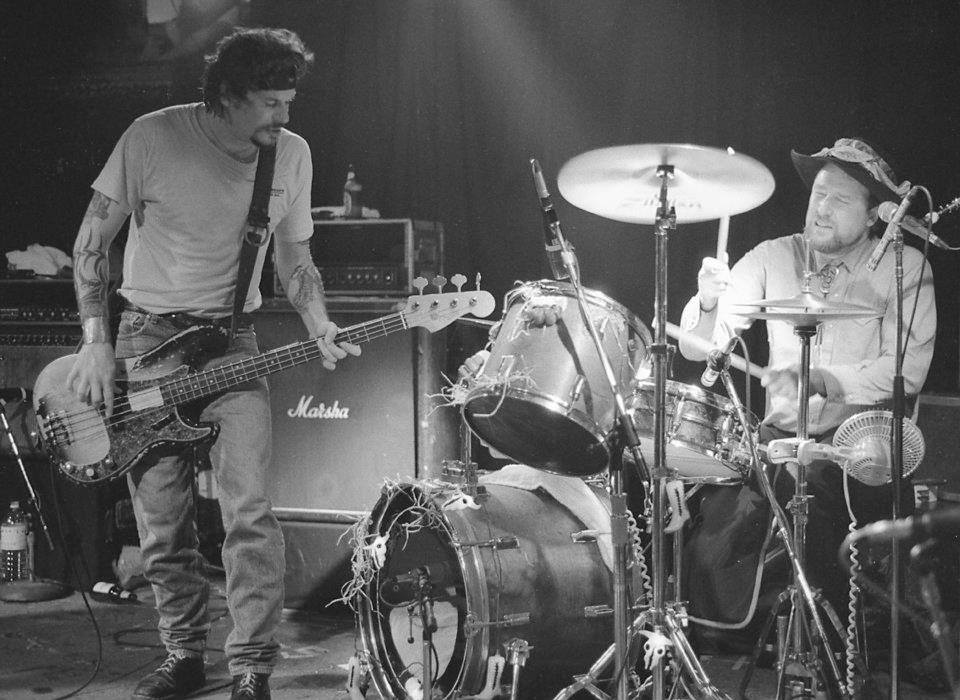
Rolle Love, who also had played in the Rockin’ Roulettes, was surfer kid from La Jolla with arms so long he had to use two guitar straps when he played electric bass. The drummer who put the whole thing together was Country Dick Montana, a gifted improvisational entertainer with a baritone voice and duster coat to protect himself from flying foams of beer.
Blue left the band in 1986 and was replaced by Joey Harris. Blue died at the age of 48 in 2006. Country Dick Montana died at age 40 during a show in 1995, which ended the Beat Farmers.
“The ensemble part of it was mind-blowing because any one of these guys could front a band and they did,” Perloff said.
With three songwriters, the band had an abundance of tunes. They usually played 40 songs during three hourlong sets. Country Dick had a knack for improving cover songs with funny lyrics.
“Those Spring Valley Inn gigs were amazing,” Love said. “It was a dive bar and we had to move the pool table to play. It was like lighting a fuse on a big bomb. You could feel it in the air. It was happening. People would come and sleep in their cars in the back parking lot. The back parking lot was really a party central”
Critics didn’t know how describe the sound that was sometimes called cowpunk, alt-country or just indescribable. But the idea was to blend punk rock spirit and country music songs, such as the Clash and Johnny Cash. Perloff was a fan of Rank and File, Los Lobos and The Blasters, which followed a similar formula. Perloff credits bands such as those as influencing the Americana bands that hit 10 and 20 years later.
Around the same time the San Diego Padres won the National League pennant, the Beat Farmers released “Tales of the New West.” The songs “Bigger Stones,” “Happy Boy,” “There She Goes” and a Bruce Springsteen cover, “Reason to Believe,” received radio play. Four singles in a debut might even inspire “Mr. Padre” Tony Gwynn to tip his cap.
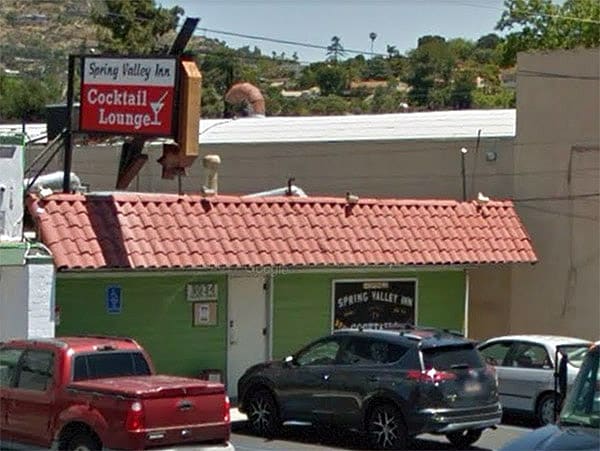
“Happy Boy” contains dark lyrics set to a carefree melody that includes a solo with kazoos and Raney gargling beer. A Pittsburgh radio station had it on a regular rotation for several years.
Bands typically make studio demos to pitch to potential record labels. But Perloff discovered the Beat Farmers too quickly for that to occur. Instead, members had a friend, Randy Fuelle, tape a show that was intended to be provided to Rhino, which began as a record store near the UCLA campus. It mostly released comedy and novelty records and was not necessarily on the lookout to sign new bands.
Perloff and head of sales Gary Stewart convinced the owners of Rhino to make a record with a $4,500 budget at Capitol Records famed round building in Los Angeles. The songs were cut in a 12-hour session. The Beat Farmers were accustomed to playing at the Spring Valley Inn from Sunday afternoons until closing time.
“It was not a problem at all,” Raney said of the marathon studio work. “We just brought a bunch of beer in there and went for it. We played completely live with the whole band. We set up a couple of dummy microphones, so we’d just sing along sort of like we were playing a gig.”
The Beat Farmers had opened a few shows for Los Lobos and befriended saxophonist and acclaimed producer Steve Berlin, who produced “Tales of the New West.” Mark Linett, who has worked with numerous notable bands including the Beach Boys, was the co-producer.
The mixing was done during off hours at Amigo Studio in North Hollywood. The litany of backing vocalists includes Vicki Peterson of the Bangles, Chip and Tony Kinman of Rank and File, Peter Case of the Plimsouls and Sid Griffin of The Long Ryders.
“Dan (Perloff) did such a great job on the re-issue,” Love said. “I look at those pictures and it really brings me back to that time. The liner notes are awesome. It’s all A-plus stuff.”
The album opens most appropriately with a song about reminiscence: “The music takes me back to my old past when I was young and feeling mean. … Saying someday we’ll be stars. … It seems like we rolled bigger stones back then.”
“Bigger Stones” was written by Paul Kamanski, who contributed songs to every Beat Farmers album. To its devout fans, the indefatigable Beat Farmers rolled bigger stones than Mick, Keith and Sisyphus combined.
Just as “Tales of the New West” was released, the Beat Farmers outgrew the Spring Valley Inn and moved to a bigger bar, Bodies, then quickly to San Diego’s largest nightclub, The Bacchanal. National and Canadian tours came after that, along with a British tour that led to the band’s next recording, a six-song EP, “Glad and Greasy,” which will be reissued in July.
“It happened like magic,” Kamanski said. “The whole beginning of the Beat Farmers, I was there, going up to LA with those guys, and they were riding on this cloud. You could feel the energy. People dug them. The bar scene was just cracking up at how crazy they were. And they had a sound, and everybody loved them.”
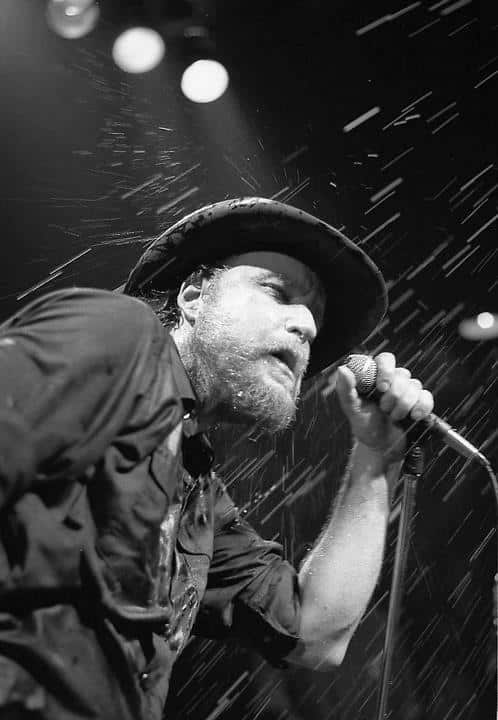
An album release performance required a drive up north.
“We took a bus and a bunch of our fans to Hollywood at the Club Lingerie,” Raney said. “We took all these lowlifes and bales of straw, set them up onstage and made a big mess. The straw was blowing out the door and onto Sunset Boulevard and back behind the bar and into the bathrooms.”
Dave Alvin and Dwight Yoakam sat in for the encore set.
“The fans really became a part of the show,” Love said. “They got involved with all the beer throwing and craziness that was kind of supposed to happen. We used to have to cover up the monitors with Visqueen and trash bags so they wouldn’t get destroyed.”
Three of the original four Beat Farmers assumed stage names. Country Dick Montana actually was Dan McLain. Buddy Blue was Bernard Seigal. And while Rolle Love sounds like a rock star name, he initially went by Rolle Dexter, whose name change in contrast to his bandmates was to not draw attention.
“All the money coming in was cash from the bars, so the idea was to be under cover,” Love said. “I went with Dexter because all the rockabilly guys were Dexter this or Dexter that. My dad was really pissed off at me.”
Love was just a kid back then, 13 years younger than Raney. After attending a Stray Cats concert, he became obsessed with rockabilly and acquired a standup bass, which he solos on “Lonesome Hound,” the eighth track on “Tales of the New West.”
A hairdresser who created a rockabilly pompadour for Love put him in contact with Buddy Blue, who was forming the Rockin’ Roulettes.
Raney was always into music but as a boy could only afford to listen to it on a radio.
“I was born in El Centro,” Raney said. “You go 100 miles east toward Arizona and there’s a desert farming town. Sucks. My family was super poor. It was just my mom and four kids. My mom was a huge Elvis fan and she and I would sing along to Elvis songs and Buddy Holly songs, Little Richard, things like that. I was in a Fats Domino fan club I was 6 or 7 with about 10 Mexican teenage girls.”
After moving to El Cajon just before starting the eighth grade, Raney became friends with a guitar player, Jack Butler, and Lester Bangs, who grew up to become a music writer for Rolling Stone and Creem magazines. From when he was 15, Raney became an accomplished guitarist, playing with bands The Dark Ages, Glory and finally Jerry Raney & The Shames.
Meanwhile, Dan McLain played drums in San Diego’s popular punk band The Penetrators. He adopted a new persona and started a band, Country Dick & the Snuggle Bunnies, which had a residency at the Spring Valley Inn. Kamanski and Harris also played in the Snuggle Bunnies.
Kamanski wrote what would become Country Dick’s theme song, “California Kid,” which was performed live by the Beat Farmers as much any of the band’s songs. It is the fifth track on “Tales of the New West.”
“Tied what was left of my horse to a hitch,
Walked into a saloon, they called the ‘Busted Bitch.’
I ordered up a whiskey, they asked me for my bread,
I paid him two bits, then I pumped him full of lead.
I got my Colt 45, right by my side.
I’m the California Kid, I hope you’re quite prepared to die.”
Kamanski described Country Dick’s deep singing voice: “He could relax so much and get down so low it was like burning butter in a pan.”
The Snuggle Bunnies were a side project to each of the members except Country Dick, and when Harris signed with a label and another player moved out of town, the band was finished. About that time, Raney, frustrated at not getting a record deal, broke up The Shames.
Raney said he attended the last Country Dick & the Snuggle Bunnies show.
“He’s standing on a table with a beer in his hand singing, ‘You picked a fine time to leave me, Lucille,’” Raney said. “At the end of the song, he falls face first off the table onto the dance floor and the microphone and — Kablam! – it makes a huge noise and he’s crying and slobbering, ‘You picked a fine time to leave me, Bunnies. Don’t leave me Bunnies.’”
Raney said he consoled the fallen singer.
“I told him, ‘What you are doing stands a better chance of making it than those other guys, really. It’s entertaining as hell.’ About a week later I get a call: ‘Hey Raney. Do you want to start a mobile musical pleasure unit?’”
Raney and Country Dick began a search for more players.
“I’d seen Buddy Blue playing around at some of the same gigs I had but I didn’t pay much attention to him. I always thought he was doing totally covers of ‘50s songs. Then I realized that some of those were actually originals that sound completely authentic to an old rockabilly song. I went ‘Awe, yeah, that’s (very) cool.’”
Now, a bass player was needed.
“I wasn’t originally supposed to be in the Beat Farmers,” Love said. “There was another bass player and he decided he didn’t like what they were doing. He just couldn’t deal with it. I was called into just rehearse with them. I never was actually told I was in the band. That was a long-running joke with us.”
Raney lobbied to hire Love: “Rolle’s got great stage presence. He’s young, good looking and can play both the slap and electric bass. He was already pretty good. He learned fast and became a very solid bass player.”
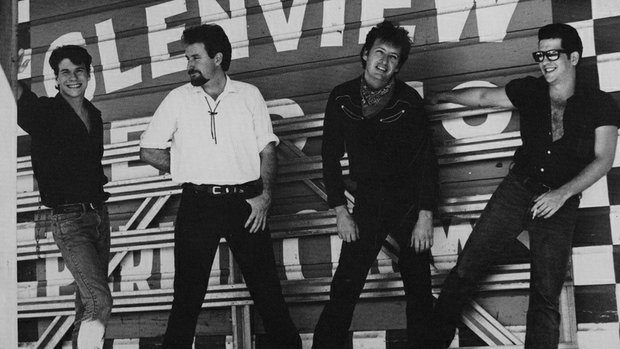
The band settled on the name Beat Farmers with a contest. Second place was Dude Raunch. The person who came up with the winning name was Chris Davies of The Penetrators, who was awarded a case of Schaefer beer.
The new San Diego super group landed a night at the Spring Valley Inn. It grew to two nights, then three (“No cover charge on Sundays!”).
“I went in there in the afternoon because it was free drinks, Love said. “I wasn’t 21 yet. I’d sit at the bar and drink and wait for the gig. One day a sheriff came in and busted me. He asked how old I was and I gave him a wrong date. The cop was cool about it. He told me to split. But that’s how that place was. It was really a biker bar. It was a cool place.”
Raney remembers the crowd as a mix of bikers, new wavers, punkers and regular country guys at their local bar.
When Perloff came to see the Beat Farmers, he witnessed a one-man opening act featuring Mojo Nixon, who later started a “psychotic rock ‘n’ roll duo” with Skid Roper, who also played with the Snuggle Bunnies.
“I begged to be in the Beat Farmers,” Nixon said. “Country Dick said there was only room for one fool, and that was him.”
Hoping to secure the deal with Rhino, the Beat Farmers made the recording that later became “Live at the Spring Valley Inn, 1983.” It was relocated by Blue in 2003, when it was first released on Blue’s own label, Clarence Records.
The album opens with Raney yelling, “Cut the jukebox.” There was no stage riser in the bar and the show was attended by about 20 people, Raney estimated.
“The banter is funny,” Raney said. “What’s great about it is there are songs on there that are not on any (of our other records.) Country Dick sings ‘Lonely Boy’ and there’s a couple of originals by Buddy that are not on anything else. And there is me doing that Elvis song ‘Trying To Get To You.’”
“‘Live at the Spring Valley Inn’ is a testament to what the band really was,” Love said. “That is the perfect recording for fans because it’s just raw. It would be like if you were a fan of AC/DC and getting something early with Bon Scott. It is as true snapshot of a time.”
-Tim Parsons
- Beat Farmers
- Disc 1: ‘Tales of the New West’
- Disc 2: ‘Live at the Spring Valley Inn, 1983’
- Label: Blixa Sounds
- CD release: April 2, 2021 — Amazon Pre-Order: LINK
- Vinyl release: May 7, 2021 — Amazon Pre-Order:LINK
Tales of the New West
1. Bigger Stones (Paul Kamanski)
2. There She Goes Again (Lou Reed)
3. Reason to Believe (Bruce Springsteen)
4. Lost Weekend (Buddy Blue)
5. California Kid (Paul Kamanski)
6. Never Goin’ Back (John Stewart)
Side B
7. Goldmine (Buddy Blue)
8. Showbiz (Jerry Raney)
9. Lonesome Hound (Buddy Blue)
10. Where Do They Go (Jerry Raney)
11. Selfish Heart (Jerry Raney)
12. Happy Boy (Dane Conover/Jeff Becker)
Live At The Spring Valley Inn, 1983
1. Never Goin’ Back (John Stewart)
2. Trying to Get to You (Singlleton/McCoy)
3. Jump Right Back (Buddy Blue)
4. Lonely Blue Boy (Wise/Weisman)
5. Beat Generation (Rod McKuen)
6. Selfish Heart (Jerry Raney)
7. Assembly Line Rock (Buddy Blue)
8. Lonesome Hound (Buddy Blue)
9. Dim Lights, Thick Smoke (And Loud, Loud Music) (Maphis, Maphis, Fiddler)
10. Big River (Johnny Cash)
11. Showbiz (Jerry Raney)
12. Sloppy Drunk (Rogers)
13. Sunday Morning (Buddy Blue)
14. Reason to Believe (Bruce Springsteen)
15. Big Rock Candy Mountain (McLintock)
16. Big Ugly Wheels (Jerry Raney)
17. Upsettin’ Me (Buddy Blue)
18. I Still Miss Someone (Cash/Cash)
19. Lost Weekend (Buddy Blue)
20. You Can’t Judge A Book by Its Cover (Willie Dixon)
21. Mondo (Country Dick Montana)
Related stories:
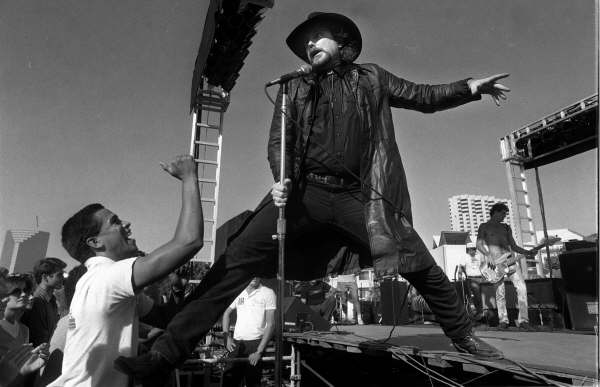
-The legend of Country Dick Montana lives on.
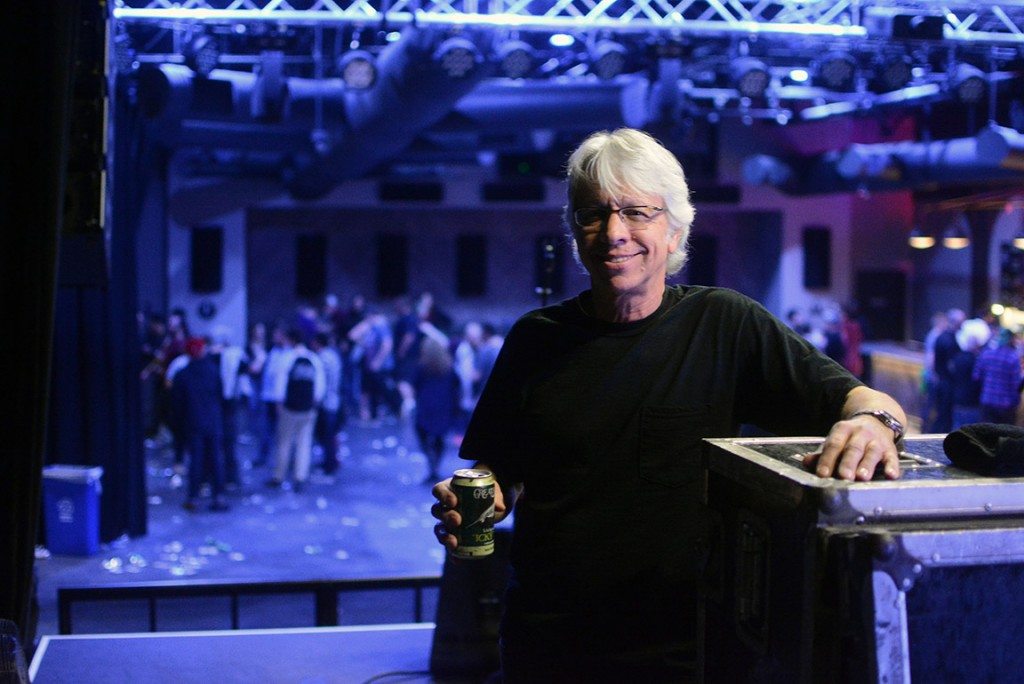
-Finally, a tune for the unsung hero Tom Ames.
